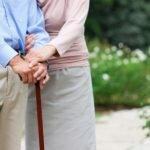Isolation Linked To Alzheimer’s Risk
It’s not often that we write in favour of pharmaceutical drugs, unless they offer real hope of a breakthrough especially when it comes to serious diseases like Alzheimer’s disease.
And in this case, the experimental Alzheimer’s drug solanezumab did just that. It showed huge potential in slowing down the deterioration of cognitive skills and memory loss in people suffering with the disease.
Unfortunately, the drug failed in the final stages of a large clinical trial, dealing a significant disappointment to patients hoping for a treatment that would alleviate their Alzheimer’s symptoms.
Solanezumab’s failure underscores just how difficult it is to find new and more advanced treatments for people suffering with even mild dementia. So, while research continuous to better understand this disease and hopefully develop a treatment that is both effective and with minimal side effects there are other ground breaking studies that can help spot early sings of Alzheimer’s disease — helping you to at least identify a potential risk.
Only the lonely?
A recent study, published in the journal JAMA Psychiatry, suggests that feeling lonely could be an early sign of Alzheimer’s disease. The researchers found that elderly patients with elevated levels of amyloid proteins – a risk indicator of Alzheimer’s disease – often experience loneliness more often than individuals with lower levels of amyloid protein.
Lead researcher Dr. Nancy Donovan, of Brigham and Women’s Hospital and Harvard Medical School, explained that people who had high levels of amyloid were 7.5 times more likely to experience isolation than those feeling connected with their loved ones and community.
Previous studies have also shown that people who remain socially active have a reduced risk of Alzheimer’s disease. This latest study suggests the reverse may also be true.
Dr. Donovan added: “People who are starting to accumulate amyloid may not be as well-functioning in terms of perceiving, understanding, or responding to social stimuli or interactions. This could be an early social signal of cognitive change.”
However, it’s important to note that while this study found evidence of a link between loneliness and early signs of the disease, it was unclear whether social isolation might actually be one of the reasons why Alzheimer’s develops or if it was simply one of the symptoms.
And finally, when Alzheimer’s disease first hit the radar it was dubbed “type 3 diabetes” and evidence suggest that it may be linked to high sugar consumption. If you want to reduce your risk of Alzheimer’s by curbing your sugar craving in as little as 14 days, we have just the thing for you.
Did you find this information useful?
Then why not get more expert health recommendations just like this delivered direct to your inbox?
"It is truly refreshing to read a newsletter on the topic of alternative medicine which is scientifically based and reviewed by professionals..." - Robert Sinott
We respect your privacy and will never share your details with anyone else.Disclaimer: Bear in mind the material contained in this article is provided for information purposes only. We are not addressing anyone’s personal situation. Please consult with your own physician before acting on any recommendations contained herein.
Sources:
People with early signs of Alzheimer’s more than seven times more likely to be lonely, published online 02.11.16, independent.co.uk
Eli Lilly’s Experimental Alzheimer’s Drug Fails in Large Trial, published online 23.11.16, nytimes.com












